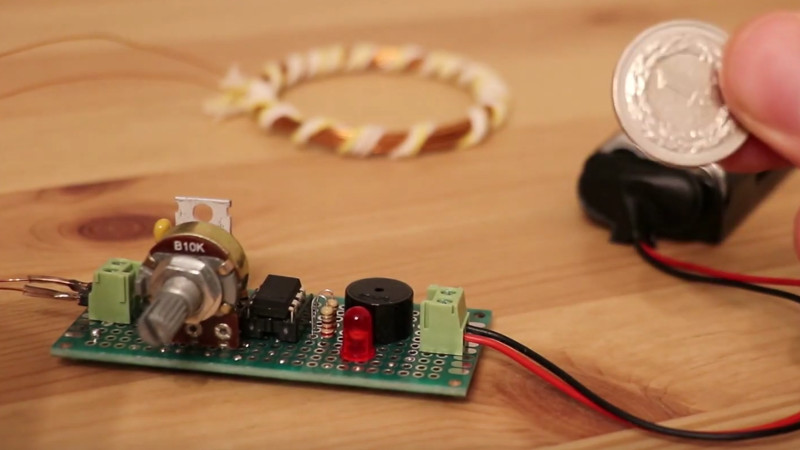A metal detector used to be an entirely analogue instrument, an oscillator whose frequency changed with the inductance of its sense coil when a piece of metal approached. [Łukasz Podkalicki] shows us a more sophisticated machine, but with judicious use of an ATtiny 13 it is not a complex one.
A pulsed induction metal detector induces a current spike in its search coil, and times the decay of the resulting oscillation. The coil is part of a resonant circuit with a capacitor, and any metal in its field will change its resonant frequency. In [Łukasz]’s design the ATtiny13 fires a pulse at his coil using a MOSFET, and the voltages at the coil are sensed by an analogue pin through an appropriate clamp circuit. His software does the timing, and sounds a buzzer upon metal detection. It’s a deliciously simple implementation, and while as he shows us in the video below the break its relatively small coil is more suited to detecting coins or wires behind the drywall than locating lost hoards, there is probably ample scope for further experimentation.
This isn’t the first project from [Łukasz] that has found its way into these pages, his history with the ATtiny13 goes back a few years.
















“W Szczebrzeszynie, wykrywacz metalu brzmi w trzcinie”
That’s easy for you to say! (Me not so much.)
Nice idea, given it could be reduced in size with tight production engineering could be placed just about anywhere Ina any number of products such as in shoes even along with all sorts of secondary processing, thanks for post.
Was considering the same thing, although in a glove/hand device
Nice one – Lol :-)
However, I prefer walking on my feet on the beach, it’s only my eldest son the Chem eng gymnast who is happy to walk a km on his hands, I guess I could make a pair for him, np but, I charge too much to ship them o/seas ;-)
Oddly since I’ve been on my own high mineral supplement formulation for a few years my shoe size has increased from about 9 1/2 to size 11 and gotten used to it, so I don’t expect to get any strange looks if I walked around in suitably crafted somewhat larger diving flippers on the beach up and down in a grid pattern from dawn to dusk with my mb on GPS recording. Worthy of a YouTube video, who’s going to be first :-o)
Cheers
That’d be ripper!! My metal detecting shoes could sense when I’m about to step on a nail, but due to my less than stellar reflexes I’d have it play a sympathetic sound in my Bluetooth headphones as the nail is running through my foot…
Something like this! https://www.youtube.com/watch?v=GzlE0I5u03c
Or, have your Bluetooth play “Walking on Broken Glass”.
The sensor should trigger a compressed gas powered propellant to drive your foot away from the threat. :-) Hey, if whole-head airbags are a thing…
The thing about analog metal detectors is that different metals have different magnetic hysteresis curves, which distorts the resulting waveform and allows one to distinguish between metals by listening to the sound.
Sounds like the beginnings of a database. DSP+powerful SOC==fun HaD project.
Easier said than done. What if there are multiple metals in there?
Along with PI or even Pulsed Eddy, the hysteresis is important I you want to ignore things. where the phase shift tend to see everything and can’t ignore. Inductive prospecting is a large portion of the mining industry tools, where phase shift(analog) can’t compete. it will be interesting to see what kind of mix-ups can be done with such a small device.
“W Szczebrzeszynie, wykrywacz metalu brzmi w trzcinie”…made me google…Polish tounge twisters? Still don’t get it yet. Need to do more searching. I an-cay ollow-fay ig-pay atin-lay but not this so much. Interesting. :-)
In original it’s “W Szczebrzeszynie chrząszcz brzmi w trzcinie” (“In Szczebrzeszyn beetle sounds in reed”). Szczebrzeszyn is a city known mostly from this saying.
A French colleague asked me once why there are no globally popular Polish songs. I said her that the main problem is that too many people thinks their radio broke when they hear them. Play above saying in Google Translate to see yourself.
“Grzegorz Brzęczyszczykiewicz”
And we can’t blame the comunists that used to run things for the grotesque vowel shortage. Did the Tzars control the polish area prior to that? Did he consume most of the vowels along with whatever mamoth meat he could find? (I can’t be too critical considering, if I remember right, the Romans often wrote words, omitting the vowels.) …funny thing about no globally popular Polish songs
[foxpup], vowels are overrated anyway.
Arabic, Aramaic, Hebrew are also “lacking in vowels (in their alphabets/writing).
Linguists refer to that as a “defective language”.
My brief (5 month) encounter with Arabic made it difficult to pronounce words because “everybody else knows what vowels sounds to put in and where”. And the written script has words joined together (unlike cursive in English) and breaks within words. (sigh!)
Of course, as I’m an English speaker, I am well aware of the difficulty foreigners have learning the language here in the U.S. (especially the Brits B^)
Translated original is “In Szczebrzeszyn beetle sounds in reed”, my version translated is ““In Szczebrzeszyn metal detector sounds in reed”. That’s why I wrote “She detects metal shells by the sea shore”, it’s another modified tongue twister, in original it was “She sells sea shells by the sea shore”. It’s multi-level language twister-pun.
My grandparents are Slovak and spelled their last name Krny. Wish I had learned the language.